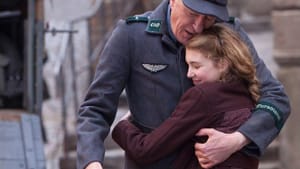Stay in the Loop
BSR publishes on a weekly schedule, with an email newsletter every Wednesday and Thursday morning. There’s no paywall, and subscribing is always free.
Horrible events in pastel colors
Brian Percival’s ‘The Book Thief’

Perhaps it’s long enough after World War II and the Holocaust for us to begin to mythologize the events and people of that time. The soldiers who fought have been labeled The Greatest Generation, and the victims, primarily Jewish, have become noble survivors.
So it shouldn't be too surprising that The Book Thief portrays the story of a young girl living in Nazi Germany as a fairy tale in which most people are kindly and noble and the streets are immaculate.
If I sound cynical, I don’t mean to. I’ve covered annual Holocaust events long enough to know the pain felt even today through most of the world when people recall what was done. And while The Book Thief isn’t a Holocaust film per se— it doesn’t show the camps or the emaciated bodies— the fate of the Jews is never far from consciousness.
Death speaks
A father is taken from his home while his wife and son look on; families wearing yellow stars walk with suitcases down the main street headed for a fate that we know more about than they do; bombs resound overhead as people huddle in cellars; windows are shattered on Kristallnacht. Yet, a bittersweetness about all this belies the horror beneath.
We are brought into the story by the gentle voice of Death, explaining how one young girl, Liesel Meminger (Sophie Nelisse), caught his attention even though she wasn’t then to be one of his victims. Death, the voice reminds us, is all around us. We will all die one day, and that’s all right.
That might be a comforting thought for the young adults to whom the book was originally directed, but I doubt it. For adults, the thought of death isn’t always separable from the circumstances under which one dies.
Learning by stealing
Liesel— who reminded me of the young Anne Shirley, heroine of my favorite childhood book, Anne of Green Gables— is sent to live with stern Rosa (Emily Watson) and kindly Hans Hubermann (Geoffrey Rush)— think stern Marilla and kindly Matthew Cuthbert. In Green Gables, Marilla and Matthew had wanted a son; here Rosa and Hans were expecting a boy and a girl. What both couples got was a fiercely intelligent young woman who falls in love with words and books and learning.
Liesel learns to read by stealing books— first from the gravedigger who buries her brother, then from the ashes of a Nazi book burning, and then from books stolen from the burgomeister’s library. She’s always learning, learning, until along comes Max (Ben Schnetzer), the son of a Jewish soldier who had saved Hans’s life in the last war.
To repay that debt, and at great risk to themselves, Rosa and Hans allow Max to live in their basement, through ill health and good, once even hiding him beneath a Nazi flag to escape detection while German soldiers searched the cellars for Jews.
While Hans gave Liesel words to take in, Max encourages her to send her words out to touch others. Through his encouragement, she begins to write and to tell stories.
Idolizing Jesse Owens
Her kindred spirit is Rudy, a blond-haired neighbor boy who looks so much the Aryan ideal that we’re surprised to discover that he idolizes Jesse Owens, the black American track star of the 1936 Berlin Olympics. Rudy, who becomes Liesel’s trusted confidante, hates the Nazis and would rather run off with only his soccer ball than join the elite corps for which he has been chosen.
The Book Thief portrays German life in the Third Reich as difficult but not overwhelmingly so. While Liesel and Hans play and race through Heaven Street (the ironic name of the street they live on), just around the corner Jews are being herded off to the camps. While they play soccer, Nazis search for Jews in the basements. While the residents hide in the bomb shelter, Max is momentarily freed from his cellar prison to breathe the fresh air.
Is it OK to turn the horrors of our time into fairy tale and myth? Perhaps that’s the only way we can hang on to them. What does one more memorial, one more documentary add to our knowledge? How many more ways can people be horrid to each other?
Jokes about 9/11
A few years ago I taught a class in comedy where one of my students told a joke about 9/11. Comedy may be transgressive, but that seemed beyond what was acceptable, so I asked him about what the event had meant to him. For me it was the destruction of the illusion of safety, the crumbling of a place where I had once worked, the loss of people I knew peripherally.
For the student, however, his personal experience of 9/11 was that he and his friends had been sent home early from school. While he learned, as he matured, the meaning of what had happened, his own personal recollection of it could never be the same as mine.
So now, as the people who study and tell the stories of World War II no longer feel a personal connection to its events, the stories will change, and eventually today’s tragedies will become history in some dry text about what happened way back then.
The Book Thief shows us horrible events in pastel colors; even the deaths of characters we’ve grown fond of are painted with soft edges. Yes, it’s meaningful, and if it moves to tears those who are only now just learning what happens when society turns on some of its members, that’s a good thing. And if it strengthens the resolve to prevent such tragedies in the future, even better.
Does it matter that it softens the edges? I don’t know.
What, When, Where
The Book Thief. A film directed by Brian Percival; adapted by Michael Petroni from the novel by Markus Zusak. At Ritz Five, 220 Walnut St. For show times, click here.
Sign up for our newsletter
All of the week's new articles, all in one place. Sign up for the free weekly BSR newsletters, and don't miss a conversation.

 Naomi Orwin
Naomi Orwin